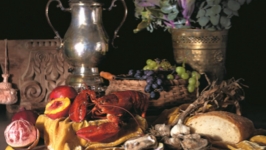Kids Raising Livestock on the Family Farm
Keep the cows happy
“The animals eat before you do,” a statement said countless times by farmers for generations to stubborn teenagers and tired youngsters who want to put up a fight before heading out to the barn. A subtle reminder that becomes a mantra and then a way of life passed from one generation to the next.
When we think about livestock farming, images of overcrowded barns, manure pits and big tractors may come to mind. But, the reality of most family farms have images of calves in the bathtub, lambs in the kitchen, kids assisting deliveries in their pajamas and making piglet formula in the middle of the night.
My family moved to our farm in Licking County in 1995 when my parents had just turned 50. As a city girl, my Mom had never been around farm animals and only knew what she had read in children’s books. My Dad, the veterinarian, had raised cattle as a teenager and thrust our family into raising sheep. Quickly our family had baby monitors in the barn and alarms set for 2am checks on laboring moms in the middle of snowstorms. Suddenly, my city-raised Mother who is the definition of “proper” had abandoned lambs living in cardboard boxes in the middle of her kitchen and was down on all four assisting ewes through difficult labors.
My parents were definitely able to skip the “birds and bees” talk after that first season of breeding sheep on the farm. These moments of caring for new mothers and babies have carried forward to my own motherhood journey. They also added a lot of colorful anecdotes to bring to birthing and breastfeeding classes that I attended with my blushing husband. Growing up, when a mother ewe was unable to care for her newborn my Dad would send us back out with a bottle in hand to milk their colostrum. We understood the lifesaving importance of this early milk, and I couldn’t contain my sheer surprise at the difference between sheep colostrum and human after my first born. I do not think the poor nurse was ready to have me go into such excited detail during those first late-night feeds!
When I reminisced about raising livestock with Jennifer Osterholt, a childhood 4-H friend who has raised cattle and pigs on a larger production level, we laughed at shared stories of county fair shows gone wrong. What was most shared was the understanding that no matter the size of the operation we all recognized the sacred relationship between the farmer and animal.
Jennifer asked her 9-year-old son Henry why they, too, live by the mantra “the animals eat before we do,” and Henry simply replied, “That’s our job!” We take for granted the deep connection to food these farm kids are taught from birth. At only 9, Henry understands that if he takes care of the animals by keeping them safe, comfortable and healthy, they will take care of his family by providing them a living.
The only real difference we could find between a tiny sheep operation and their larger production was the fact that baby calves didn’t end up in the kitchen. Instead, they ended up in the heated barns. Jennifer laughed and said, “It was probably warmer in the barn. We spent the extra money to heat the barn and keep the cows happy. After all, my parents said, kids could just use blankets to stay warm.”
On our farm we have watched the tender lessons of respect and nurturing form in the lives of the youngest family members. The granddaughters name each and every baby chicken brought into the flock. Last month they named 60 chicks and swore they could tell them apart. At only 4, Sophia corrected a drawing of the chicken coop and fixed the mistakes by adding heating lamps and fences to protect them from hawks.
In this world of “big ag” and the confusing labeling around “cage free” and “free range,” it is important to remember that at the heart of shopping from local family farms is the daily sacrifice these families make to ensure their animals are safe and comfortable. Imagine me with a plastic grocery bag wrapped around my professionally done hair and make-up ready for senior prom headed out to the barn to feed my 4-H steer and hogs minutes before my date picked me up. It was hard to be a cocky teenager when I was constantly submitting myself to care for our pigs.
I look forward to engraving these same lessons of respect for all life into the lives of my children and watching them roll their eyes as I remind them one more time, “the animals eat before we do.”





